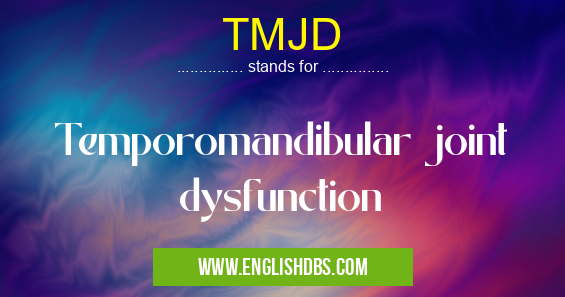What does TMJD mean in BRITISH MEDICINE
TMJD stands for Temporomandibular joint dysfunction, a condition characterized by pain and dysfunction in the jaw joint. This joint connects the lower jaw (mandible) to the skull (temporal bone). TMJD can affect one or both sides of the jaw and can range in severity from mild to severe.

TMJD meaning in British Medicine in Medical
TMJD mostly used in an acronym British Medicine in Category Medical that means Temporomandibular joint dysfunction
Shorthand: TMJD,
Full Form: Temporomandibular joint dysfunction
For more information of "Temporomandibular joint dysfunction", see the section below.
Causes of TMJD
The exact cause of TMJD is often unknown, but several factors may contribute to its development, including:
- Misalignment of the jaw
- Muscle tension or spasm in the jaw
- Injury to the jaw or head
- Arthritis or other joint problems
- Stress or anxiety
Symptoms of TMJD
TMJD can manifest in a variety of symptoms, including:
- Pain in the jaw, face, or neck
- Clicking, popping, or grinding sounds in the jaw
- Difficulty opening or closing the mouth
- Locking or stiffness in the jaw
- Headaches or earaches
- Dizziness or vertigo
Diagnosis of TMJD
A dentist or doctor will typically diagnose TMJD based on a physical examination of the jaw, a review of symptoms, and possibly imaging tests such as X-rays or MRI scans.
Treatment for TMJD
Treatment for TMJD aims to relieve pain and improve jaw function. Options may include:
- Over-the-counter pain relievers
- Muscle relaxants
- Oral splints or mouthguards
- Physical therapy
- Surgery (in severe cases)
Prevention of TMJD
There is no surefire way to prevent TMJD, but certain practices may help reduce the risk, such as:
- Avoiding excessive jaw movements (e.g., chewing gum, nail-biting)
- Practicing good posture
- Managing stress
- Maintaining good oral hygiene
Essential Questions and Answers on Temporomandibular joint dysfunction in "MEDICAL»BRITMEDICAL"
What is TMJD?
Temporomandibular joint dysfunction (TMJD) is a condition that affects the temporomandibular joint (TMJ), the hinge that connects the jaw to the skull. It can cause pain, clicking, popping, or locking of the jaw.
What are the symptoms of TMJD?
Symptoms of TMJD can include:
- Pain in the jaw, face, or neck
- Clicking, popping, or locking of the jaw
- Difficulty opening or closing the mouth
- Headaches
- Earaches
- Tinnitus (ringing in the ears)
What causes TMJD?
The exact cause of TMJD is unknown, but it is thought to be caused by a combination of factors, including:
- Misalignment of the jaw
- Muscle tension
- Arthritis
- Injury to the jaw
How is TMJD diagnosed?
TMJD is diagnosed based on a physical examination of the jaw and a review of the patient's symptoms. The doctor may also order imaging tests, such as X-rays or an MRI, to rule out other conditions.
How is TMJD treated?
Treatment for TMJD depends on the severity of the condition. Treatment options may include:
- Medications to relieve pain and inflammation
- Physical therapy to improve jaw function
- Splints or mouth guards to align the jaw
- Surgery in severe cases
Final Words: TMJD is a common condition that can cause significant discomfort and interfere with daily life. Understanding the causes, symptoms, and treatment options is crucial for managing TMJD effectively. By following preventive measures, individuals can help reduce their risk of developing this condition.
TMJD also stands for: |
|
| All stands for TMJD |
